- Home
- Jane Arbor
The Cypress Garden
The Cypress Garden Read online
THE CYPRESS GARDEN
Jane Arbor
It was through young Michele that Alix first met the wealthy Parigi family—but it was with his dominating older brother Leone that she was to have the stormiest relationship.
CHAPTER ONE
If the soft Italian voice had said, ‘Mi scusi—’ Alix would have replied with the conventional ‘Prego’, before going on her way. But on a note of persuasion it had said, ‘Permette, Signorina Rhode?’ at the same time as its owner emphasized his, “If you please?” by catching lightly at her wrist as she passed, causing her to pause.
Coolly, ‘What do you want, signore?’ She turned her wrist and he let go. But his dark eyes smiled into hers and his answer was disarming. ‘I want very little of you, signorina. Just a few minutes of your time, your company. Please—?’
Alix had not lived for nearly a year in Rome without growing armour against such approaches. But they were usually the Italian version of the wolf-whistle, bolder and more cavalier than this one, and she was intrigued that the young man knew her name. She said mechanically and without strict truth, ‘I have to go, signore. I’m in a hurry—’ and he made the most of her moment of hesitation by patting the empty stool beside him invitingly.
‘I know you’ve lunched, signorina. But you’ve time enough to have an ice with me? Try Carlo’s special monte bianco—won’t you—no? After all, we’re not complete strangers. You must have seen me here before, even if not as often as I’ve noticed you? So please—?’
‘Grazie.’ Alix followed her thanks by taking the stool. She was not really in a hurry and there was no harm in accepting an ice from him. He was the first person of about her own age to whom she would have spoken more than a few words for some weeks, and it was true that she knew him well by sight. Though he did not frequent Carlo’s Trattoria as regularly as she had lately for her modest lunchtime pizza or risotto, she had seen him several times, sometimes alone, sometimes with another youth, both of them lean and bronzed by the Roman sun and both of them in the classless uniform of their age—tight jeans, T-shirts and bare feet in thonged sandals. But by now she could distinguish accents, and this one’s was cultured. There was no harm ... Besides, how did he know her name?
‘Simple,’ he smiled at her as she spooned into the cream-topped chestnut puree that was Carlo’s monte bianco. ‘I asked Carlo. He knew it and he told me. More about you too, but not enough. For instance, not your first name. What is it?’
‘What’s yours?’ she countered.
‘Michele. And—?’
‘Alix. That is, Alessandra really. But Alix for short and in England. I suppose you could tell I’m English?’
‘Only half so, Carlo thought. Your father, Signor Rhode—the English half of you—no?’
Alix nodded. ‘It was my mother who was Italian.’
‘ “Was”?’
‘She is dead. So is my father now. Just before Easter, this year. What else did Carlo tell you about me besides my name?’
Her companion smiled. ‘As I’ve said, not enough for my purpose. That’s why I stopped you today. To throw myself on your mercy. Because you see I rather need to know more about you than your name; that you speak Italian like a Roman; that Carlo thinks you don’t work for your living; that your father was an English banker—’
Alix corrected, ‘If I want to stay on in Italy—and I do—I must work, though I haven’t a job at the moment. And my father wasn’t a banker. He was under-cashier at the Via Nationale branch of the City and Metropolitan, an English bank, and I’ve learned most of my Italian during the year I’ve house-kept for him and nursed him. And anyway, why do you need to “rather know” more about me than Carlo could tell you? And what?’
‘Oh, little things.’ His shrug and the upward gesture of his hand were pure Latin. ‘Say, the date of your birthday. Your second name if you have one. Where you went to school. Whether you’ve got a boy-friend—Silly things like that. But things I couldn’t possibly know about you if you didn’t tell me. D’you see?’
Alix said carefully, ‘Rather intimate things. Why?’
He threw her a calculating glance. ‘If I tell you, will you promise to play along?’
‘Not unconditionally, no.’
A grimace. ‘I suppose I asked for that. Oh well—You may have seen me in here with another character? Name of Beppo Brindisi, if it matters. Well, he bet me that you’d give me the brush-off if I spoke to you, and that I couldn’t keep you long enough to give you an ice or a drink.’
Alix flushed. ‘Well, you’ve won, haven’t you?’
‘So far as the ice goes, yes. I’ve got Carlo for witness that you accepted. But the Beppo type insisted on other proof that I’ve really got to know you. Hence the silly questions about your birthday and so on. And I’d take it terribly kindly and not pester you any more if you’d only let me have a signature for—this.’
‘This’—produced from a back pocket—proved to be a coloured snapshot of Alix herself. She took it from him and studied her likeness; the white sleeveless, deep square-necked day dress, honey-gold tanned arms, legs and shoulders, the long hair touched by copper lights and held back under a white Alice-band, and the fine bones of face and figure which were her heritage from her mother. Above her was the deep blue of Roman noonday sky and behind her the busyness of the Ponte Garibaldi. She must have been snapped from the doorway of Carlo’s Trattoria; on leaving the bridge she would only have had to cross the road to reach the cafe.
Her companion examined his work over her shoulder, then tweaked it from her. ‘Good of you, hm? But then you’re so pretty, how could it not be? I took it last week. Am I forgiven?’
She was torn between irritation and amusement at his effrontery. ‘What is it all in aid of, for goodness’ sake?’ she asked.
‘I’ve told you—just to win my bet. You’ll sign it? You can have it back afterwards, if you insist.’
‘Oh, all right.’ She wrote quickly, “Alix” and was about to add “Rhode” when he stopped her. ‘You couldn’t manage, “Yours, Alix” or “From Alix to Michele”, could you?’
‘No, I couldn’t, and I would like to have it back when you’ve finished with it.’
‘So you shall—“when”,’ he agreed. ‘And now the other bits of nonsense. Let’s see—when is your birthday, and at a guess you’ll be—nineteen?’
‘I shall be twenty on the twenty-first of this month.’
‘Three weeks hence. I shall be twenty-one myself a week later. And the rest—you say you haven’t always lived in Italy?’
‘I haven’t. When my mother was ill and homesick for Italy, my father exchanged into the Rome branch of the Bank and brought her back. That was eight years ago. I stayed behind in England with Papa’s sister, my Aunt Ursula, who is a teacher. I used to come to Italy for some school holidays, but I didn’t come for good until after I left school and Papa was ill and needed me.’
‘Your mama had died, meanwhile?’
‘Three years ago—What are you writing down?’
Michele looked up from the beverage-list on which he was scribbling with a gold-plated ballpoint. ‘Just the evidence for Beppo,’ he grinned. ‘We’re doing fine. Let’s see—An English Zia Ursula ... City and Metropolitan ... nearly twenty, and in Rome for about a year—Where did you live with your papa, and do you still live there?’
‘No. We had a flat near the Villa Sciarra, but I couldn’t afford to stay there. Since my father died I’ve had a job with a travel agency. But it suddenly closed its doors and folded. Now I’m on the point of moving into a one-room apartment this side of the river, in the Trastevere, but—’ But at that point some belated note of caution warned Alix against saying any more. She got down from her stool. ‘That’s all a
bout me,’ she said. ‘Thanks very much for the monte. It was delicious. Good luck over your bet. I really must go now.’
He stood beside her. ‘A thousand thanks. You’ve been—magically kind. But I’ll see you here again? To report and to give you back the snapshot?’
‘Perhaps. It depends on where I’ll need to lunch when I get a new job.’
‘Oh, please—just once? After I’ve floored Beppo? And may I drop you anywhere now? I’ve only got an old topolino, but it’s parked right outside, and you’ve only to say where.’
Alix hesitated. ‘I’m only going to the station,’ she said.
‘Terminale?’
‘No. The Trastevere, straight down the Viale from here.’
‘Easy.’ He paid Carlo and led the way out into the sunshine and across to the parked runabout, ten thousandth twin to every other fussy, noisy minicar in the city. ‘Travelling by train from Trastevere?’ he asked casually.
‘No. I have to call at the Left Luggage office, that’s all.’
‘And then?’
‘Just drop me at the station and leave me, please,’ she said firmly.
On the way down the long south-running avenue he said, ‘Don’t I owe you more about myself than just “Michele”?’
She had to smile. ‘Do you?’
‘I’d think you'd consider so. Well, I’m Michele Parigi; you know my age. Just now I’ve got the loan of a one-room bachelor pad this side of the river, from a friend who is at Milan University during term. Officially I live with my family—my mother and my half-brother, Leone. A second cousin, Venetia d’Anza, who has no mother, spends the whole of each summer with us, while her father is in America on business and they close their own villa at Amalfi. “Home” is the Villa Fontana above Lake Albano. Take the Old Appian Way; follow the signs for Castelgandolfo and climb—and there you are.’
‘I see.’
He slanted a glance. ‘Don’t show any interest, will you? Doesn’t “Parigi” say a thing to you?’
‘Should it? Oh yes. You mean your family is Parigi Cameos, the jewellery makers?’
A nod. ‘The same. Auguste Parigi married my mother as his second wife. She is not Leone’s mother. And now he “is” Parigi Cameos. As no one is allowed to forget—’
‘And what do you do in the firm?’
‘Me? I don’t. Cutting bits of agate and onyx for the tourist trade doesn’t particularly appeal. I’m afraid.’
‘Then what do you do for a living?’
‘Nothing. I’m just one of those layabout parasites, according to Big Brother Leone.’ He pretended to hang his head, then straightened and brought the car in a wide sweep to halt on the station apron. ‘There! You’re quite sure I can’t take you on somewhere?’
‘No, thank you very much.’ Alix alighted and offered her hand, Italian fashion. ‘Addio,’ she said with pointed finality.
He grinned. ‘You don’t mean that. Arrivederci—Alix!’ he said.
Alix watched him go, then went about her business in the station, intrigued against her will by the encounter, but glad she had given him no lead by which he could follow her up. She need not go to Carlo’s again. There were plenty of other trattorias equally cheap and clean where she could eat, and she could not afford to worry about recovering that snapshot which she had only signed with her first name.
But she could not help going over the exchange in her mind—on the surface as innocent a “pick-up” as she had ever had to parry. Michele Parigi hadn’t pestered her beyond a point and hadn’t been secretive about himself. Yet somehow the thing had overtones she did not understand; something which jarred.
Was it the bet of which he and his friend Beppo had made her the subject? Or was it Michele’s anxiety that she would show herself impressed by the name ‘Parigi’, which she knew quite well as a byword for wealth and success and craftsmanship in its sphere? Or was it his sour quip about his stepbrother’s one-man authority over the firm?
She did not know. But of one thing she was sure that afternoon. She had meant her good-bye to him to be as final as it had sounded. She would not be seen at Carlo’s place again.
She collected the personal luggage—a couple of suitcases and a holdall—which she had left earlier at the station. The rest of the things she would be taking to the small one-roomed flat she had found would remain in store for another week. The outgoing tenant had not yet moved and she had taken a room in a modest back-street pensione for the next few days. Outside the station she called a taxi and directed the driver. There was no porter at the boarding-house and she had to take her luggage up herself. The room was darkly shuttered against the sun, already hot for early May; the clatter from the cobbled street below was muted by the closed double windows and depression settled down upon her like a cloud.
Until at least four o’clock the city would be in siesta; shops and offices closed and the nearest park too many streets away. At four she would go out and window-shop a little, perhaps; buy an evening paper and search the Wanted columns for suitable jobs. Tomorrow she had a couple of prospects in view in the English and American tourist centre around the Via Veneto. But the rest of this day was a desert of drowsy afternoon and lonely evening. When, in the first flush of her love affair with Rome, she had told herself that this was her city and vowed that nothing should take her away from it for long or keep her from it for good, she had had her father to point out its beauties and to love it too for her mother’s sake. They had been such companions that she had not missed other contacts, and during the months of his last illness she had busied herself with his care alone.
But he was dead. She found herself only with acquaintances whom it would need time to turn into friends, and since losing him there had only been the benison of the sun to offset the prosaic necessity of finding a job and to lessen an ache of loneliness which she had never known before.
How wise had she been to resist her Aunt Ursula’s persuasion to go back to England and start a career there? She supposed only time would tell, and she had a little time. Such money—not much—as her father had left was here in Italy, and if she could find a job, she longed to stay. But the collapse of her first opening had done something to sap her confidence. Supposing...? Supposing...? She seemed to be living on a razor’s double edge of hope and pessimism—sometimes one the sharper, sometimes the other. And this afternoon she knew she was blaming that boy for her present slough. Envying him his airy sureness of family, of background; of his being native-born Roman where she was only hybrid alien; of belonging as she never would—quite—either to England or to Italy...
Oh well—! Feeling the ache of tears of self-pity ready to start to her eyes, she forced herself to begin to unpack; to give the impersonal dreariness of the room something of her own individuality; to choose a dress to change into and to strip for a sponge-down.
It was the basin-tap marked Caldo, though it ran ice-cold, and the other one marked Freddo which ran lukewarm which sent her volatile spirit soaring again. Dear Italy! she thought. How she loved it for rarely getting its plumbing straight! For that, and for so much more. For—
But her loves were too many to list. Save them for a sleepless period in the night. She was going to stay! She must. Tomorrow—according to Scarlett O’Hara, wasn’t it?—was another day.
But next day both her prospects came to nothing.
One employer needed an older woman; the other opening, for a receptionist at a tourist hotel, was already filled. After both interviews she ate at a self-service counter in the Piazza Barberini; sat for a while in the Villa Borghese Gardens, walked down the Spanish Steps, bought a bunch of anemones because they were cheap and were short stemmed enough to be happy in her tooth-mug, and made her way back across the city by autobus.
In her room again she got into a dressing-gown and lay down; drifted into sleep. When she woke the sun was low and her shuttered room dark, and there was knocking at her door.
‘One minute!’ Brushing sleep from her eyes, she confronte
d the desk-clerk who doubled as porter. ‘Yes?’
‘A gentleman to see you, signorina. Downstairs. He is waiting.’
‘A man? No, not for me.’
‘He asked for you by name, signorina, and gave his own—Signor Parigi, a friend. He begs you to see him, please.’
Alix gasped. This was fantastic. ‘Tell Signor Parigi I was not expecting him and do not wish to see him,’ she said.
‘And if he insists, signorina?’
‘He won’t.’
‘If he’s wise,’ she added to herself as she closed the door.
The clerk was hardly gone before he was back. He said woodenly, ‘The signore insists,’ and Alix suspected that money might have changed hands.
‘Oh, very well. I’ll be down,’ she said, and deliberately dawdled over dressing and doing her face and hair in order to make Michele wait.
Downstairs she did not have to put the obvious question. With a deprecatory smile he answered it. ‘You’re wondering how I found you. I’m afraid I followed your taxi yesterday. Now be angry, for I deserve it, I admit.’ He jerked his head at the clerk, whose ears were pricked with interest. ‘Do we have to entertain him? I really came to ask you to have dinner with me. Will you?’
‘You must excuse me.’
She watched him appraise her grooming; her cream silk shift and matched scarlet handbag and sandals. ‘You’re dining with someone else?’
‘No. Here.’ Her heart sank at the thought of the pensione’s communal dining-table, its uninspired food. And as if he read her thoughts he pounced.
‘Then with me, please? Why not? Look, I made myself presentable—’ He had—groomed and darkly handsome in a well-cut suit, he had a certain attraction. ‘And after yesterday I owe you a dinner at least. Now don’t I? And if you’ll accept tonight I’ll promise—’
Her abortive day and last night’s loneliness made Alix waver. What, after all, was one dinner? And how else was she to be rid of him? ‘You’ll promise—what?’ she asked.

 High Master of Clere
High Master of Clere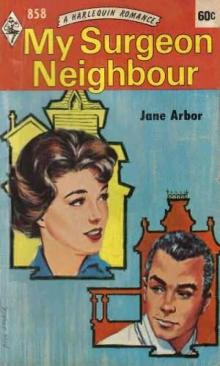 My Surgeon Neighbour
My Surgeon Neighbour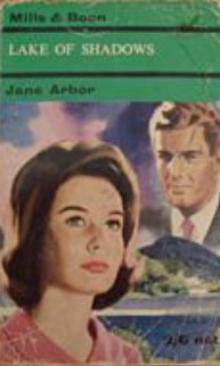 Lake of Shadows
Lake of Shadows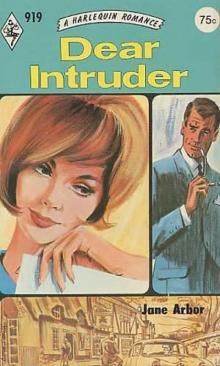 Dear Intruder
Dear Intruder Flash of Emerald
Flash of Emerald Return to Silbersee
Return to Silbersee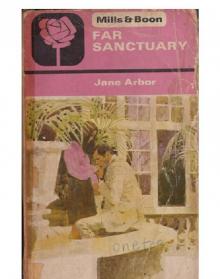 Far Sanctuary
Far Sanctuary Sandflower
Sandflower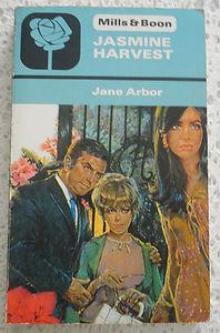 Jasmine Harvest
Jasmine Harvest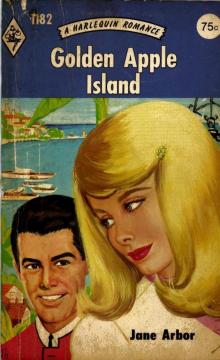 Golden Apple Island
Golden Apple Island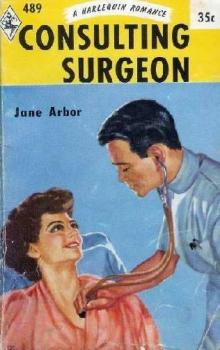 Consulting Surgeon
Consulting Surgeon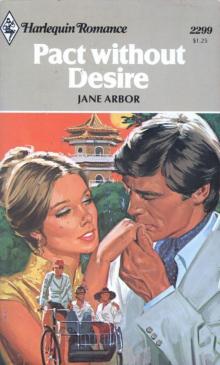 Pact without desire
Pact without desire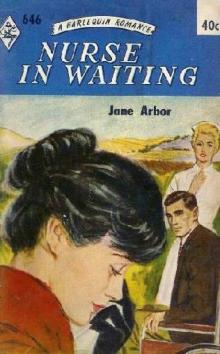 Nurse in Waiting
Nurse in Waiting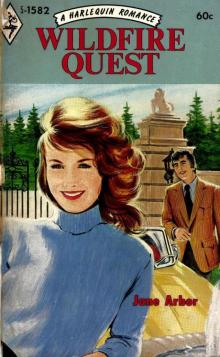 Wildfire Quest
Wildfire Quest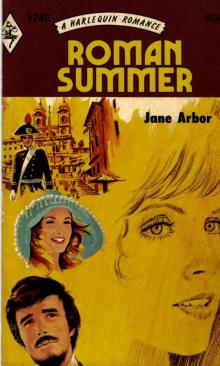 Roman Summer
Roman Summer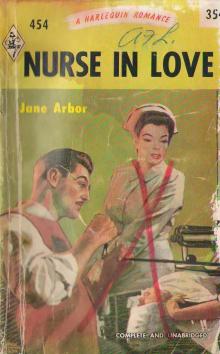 Nurse in Love
Nurse in Love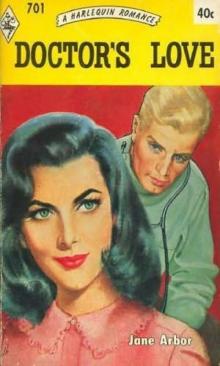 Doctor's Love
Doctor's Love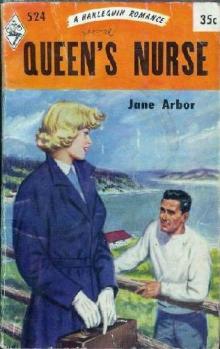 Queen's Nurse
Queen's Nurse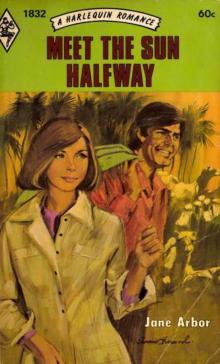 Meet the Sun Halfway
Meet the Sun Halfway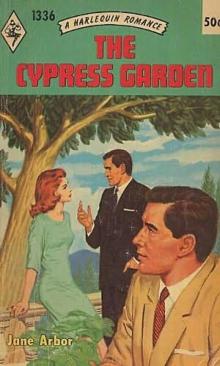 The Cypress Garden
The Cypress Garden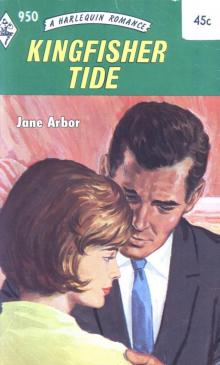 Kingfisher Tide
Kingfisher Tide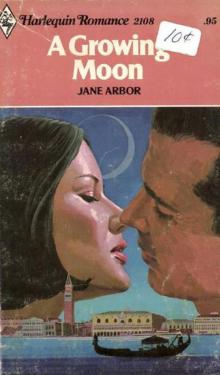 A Growing Moon
A Growing Moon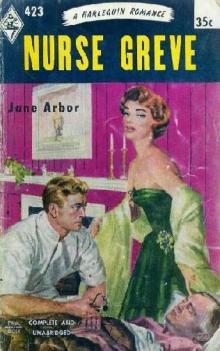 Nurse Greve
Nurse Greve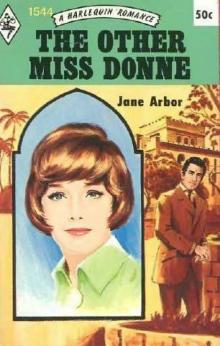 The Other Miss Donne
The Other Miss Donne